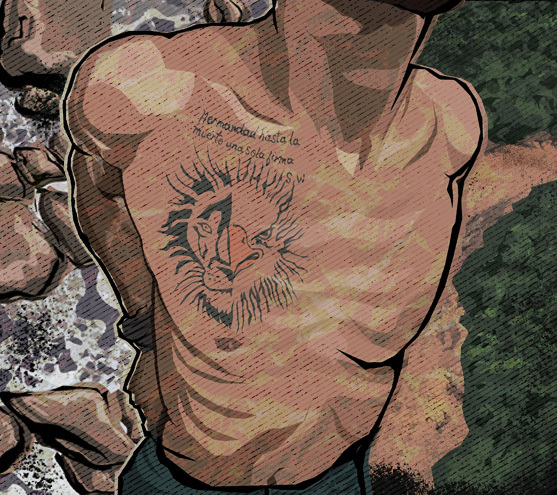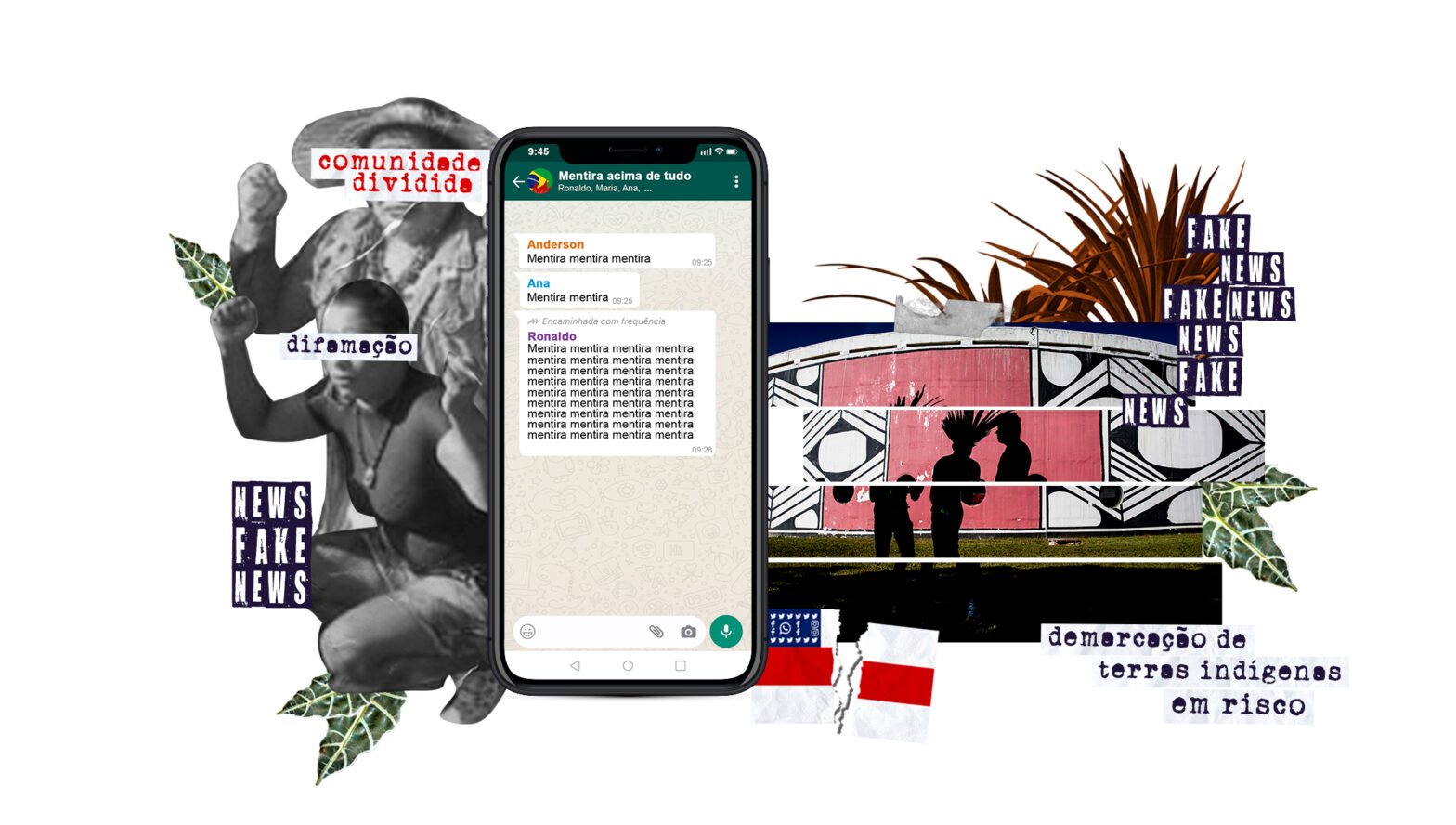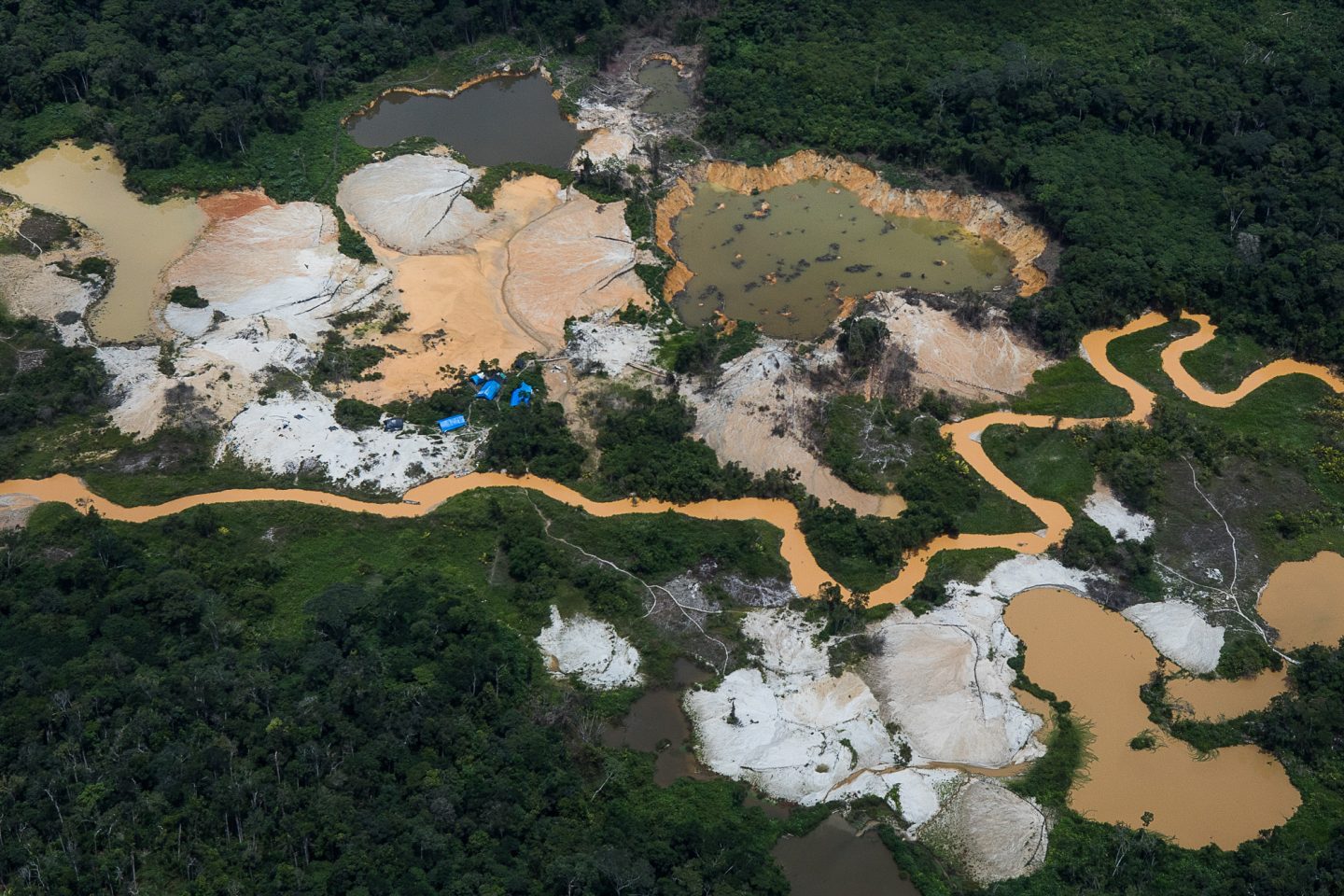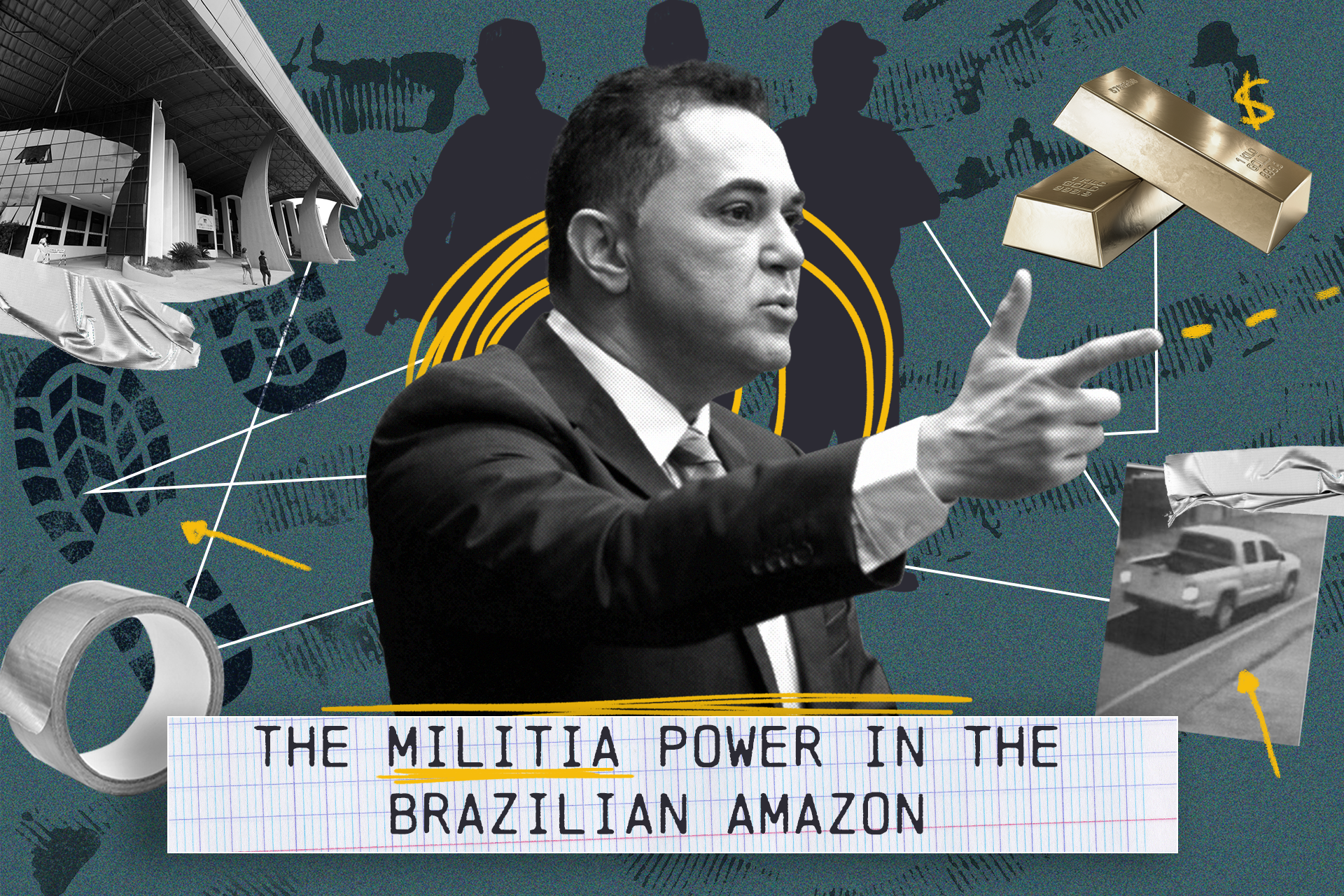
Confidential documents obtained by InfoAmazonia detail how a Brazilian politician commanded an armed militia that spied on and kidnapped opponents in the Amazon.
Over 4,000 pages from official investigations reveal how Roraima state congressman and former president of the Legislative Assembly Jalser Renier led the criminal organization. The militia gained power and influence through threats, violence, job offers, and a series of illegal deals involving weapons, mining on indigenous land, and the financial markets.
At the end of February, after the release of the first findings of the investigation, Jalser lost his investiture. Having lost his parliamentary immunity, he may now be arrested like his other partners in crime.
Silver duct tape, tire tracks, and footprints. These unlikely clues led the police to uncover evidence of an armed militia operating inside the Legislative Assembly of Roraima, Brazil’s northernmost state, and that one of their most powerful representatives, Jalser Renier, was the militia’s leader. Known in this state of 500,000 inhabitants bordering Venezuela simply as “Jalser”, the representative is accused of committing a series of crimes with the assistance of at least nine members of the armed forces – most of them military police elite members, including three colonels and a major, all assigned to the Legislative Assembly’s Intelligence and Organic Security Service (SISO).
InfoAmazonia got access to the State Prosecutor’s formal accusation against the group, based on the 4,000-page police report and hearings from a special Task Force. The investigations indicated that the group committed a series of crimes between 2015 and 2020, when Jalser was the Legislative Assembly’s president. Following Renier’s orders, the group allegedly spied and kidnapped opponents, provided guns to illegal mining activities and private security for companies and politicians. One of the militia’s victims, according to the police, was journalist Romano dos Anjos, who was kidnapped and tortured during the 2020 municipal elections. The police also found that the group had ties to the financial company By Money, which illegally handled over BRL 90 million (US$17.5 million) last year. The company went bankrupt in 2021, shortly after the police arrested the first members of the militia.
He created a true militia inside the Legislative Assembly, with intelligence specialists, officers, and elite military soldiers loyal to him (including members of his personal guard) in order to serve his whims and intimidate his political opponents.
State Prosecutor’s Office
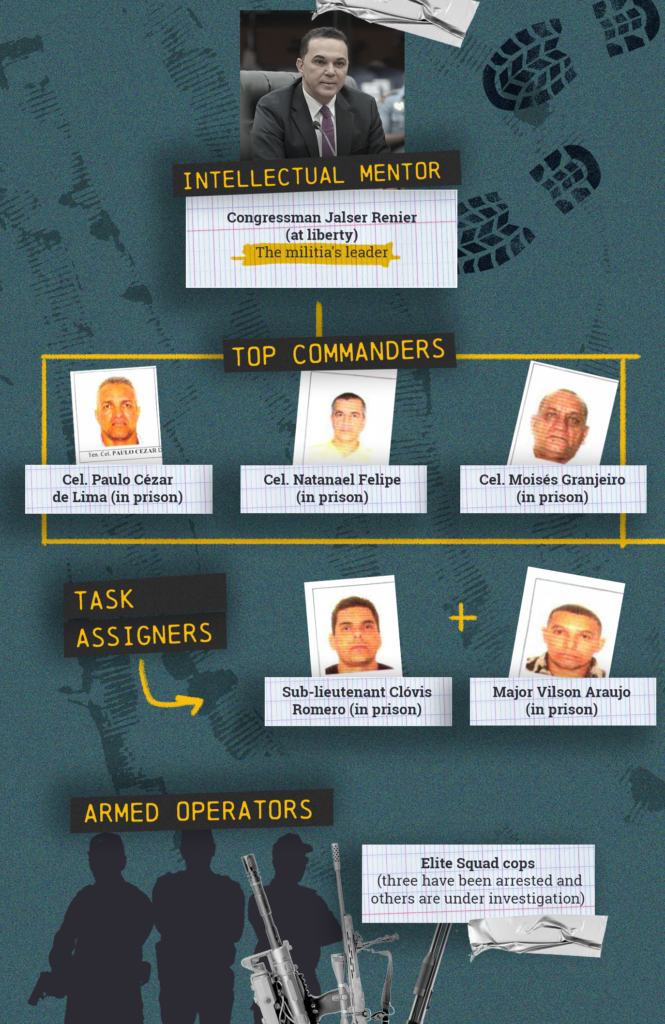
In the complaint filed in October last year against the group, state prosecutors wrote that congressman Jalser, along with his partners, created, inside the Roraima Legislative Assembly, “a true militia, with intelligence specialists, officers, and elite military soldiers, loyal to him (including members of his personal guard) in order to serve his whims and intimidate his political opponents.
The nine cops identified as the militia operators have been detained since the end of 2021 for their crimes. So far, congressman Jalser is the only one that remains at large. In October 2021, he was held for four days under accusation of involvement in the journalist’s kidnapping but was released from prison thanks to his parliamentary immunity. But on February 28, the Legislative Assembly revoked his mandate, and prosecutors have already requested his arrest.
The kidnapping, the clues, and the business of an Amazon militia
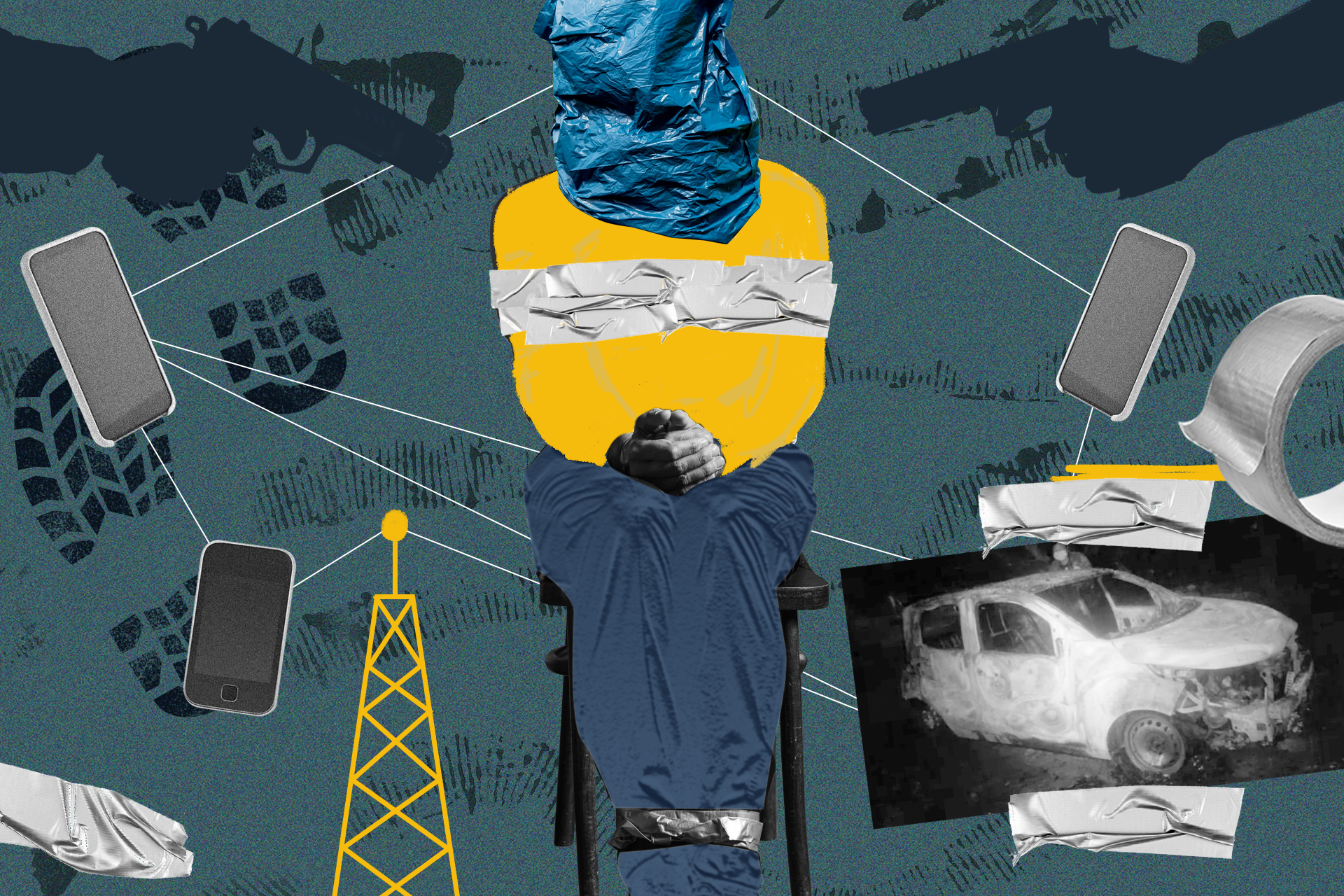
40-year-old Journalist Romano dos Anjos and his wife were kidnapped on October 26, 2020, in Boa Vista, the Roraima state Capital. Romano was leaving his bedroom when he came across them in the hallway “all in ski masks, gloves, and black shirts,” he told InfoAmazonia in an interview. “Despite the situation, I tried to remain calm and keep my eyes open. By the way they grabbed me and lifted me off the ground, just like the cops do, I knew from the get-go that we weren’t dealing with your run-of-the-mill bad guys. I was sure they were people with military training.”
His wife was locked in a room, but she managed to free herself from her bonds and climbed out of the window. Romano was taken in his own car and later transferred to a pickup truck. His car was set on fire. “I’m still paying off the car,” he told InfoAmazonia.
By the way they grabbed me and lifted me off the ground, just like the cops do, I knew from the get-go that we weren’t dealing with your run-of-the-mill bad guys I was sure they were people with military training.
Romano dos Anjos, journalist kidnapped by the militia
On the way, the kidnappers hit Romano, while mocking him. “Aren’t you Mr. Tough Guy? The guy who shoots off his mouth inside the studio? Say something now!”
The militia members took precautions to avoid leaving tracks of the kidnapping, such as keeping their cell phones off on the night of the crime and avoiding exchanging messages by phone and internet. But it wasn’t enough to hide their tracks. Sheriff João Evangelista dos Santos focused on forgotten clues to track down the criminals. The remains of a silver tape — more sticky than the normal kind —, boot prints and tire marks were some of the clues left by the group. In addition, police officers scanned cell towers and discovered that members of the gang had been monitoring the journalist for days before the crime.
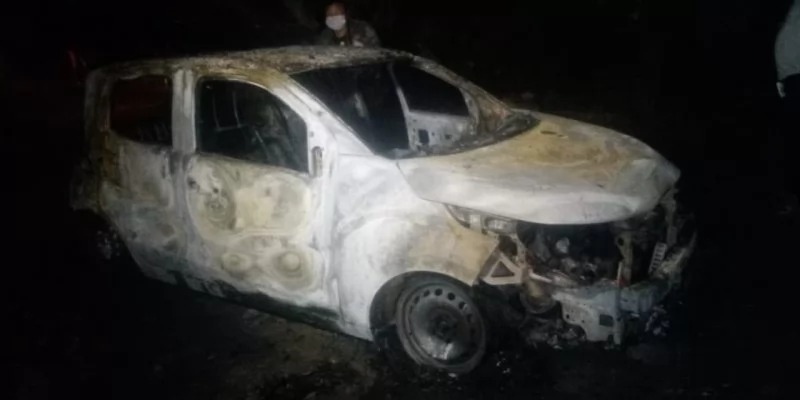
The Civil Police suspected from the beginning that they were not dealing with common criminals. An invoice found during the searches gave the detectives the first clue. It revealed that the driver of Colonel Paulo Cézar, the congressman’s right-hand man who is now accused of planning the kidnapping, had bought silver duct tape days before the kidnapping. The type was identical to the one used to bind the journalist and his wife. Paulo Cézar’s driver would later confirm the purchase to investigators.


The police also compared the footprints where the journalist was found, which matched the soles of boots seized during the investigation into Romano’s kidnapping. The hypothesis was confirmed by tire tracks found on the road, which resemble those of an Assembly truck used by SISO officers.
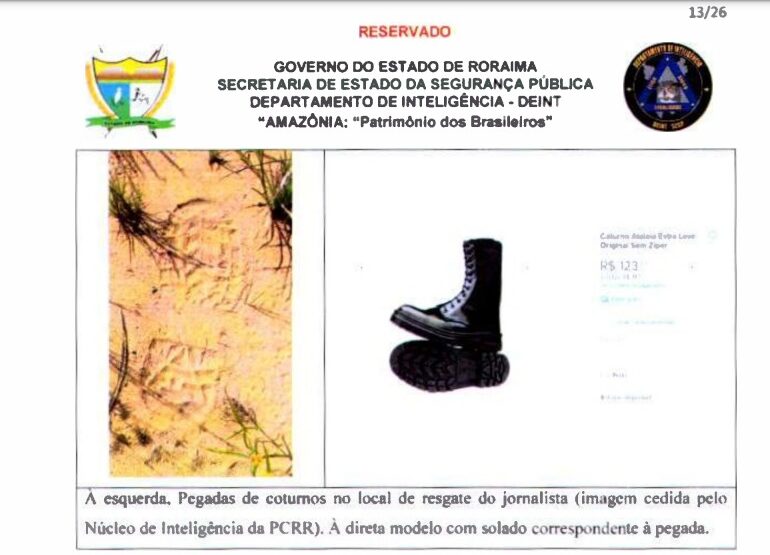
Finally, signals from telephone towers confirmed that, hours before the crime, Paulo Cézar was not at the mall as he told in his testimony, but in the region where the journalist’s car was set on fire. He was also close to where Romano was found after the torture session, blindfolded and with broken arms.
A plan to consolidate power
The Task Force that investigates the case claims that Jalser created the so-called Intelligence Service (SISO) in the Legislative Assembly to “perpetuate his command” as president. The strategy worked between 2015 and 2021, when Jalser managed to be three times consecutively re-elected to the position, which is illegal. The legislation authorizes only one reelection.
In January 2021, when he was starting his sixth year as the Legislative Assembly’s president, Jalser was removed by order of the Supreme Court. The highest court in Brazil also determined the house to resume the process of removing Jalser’s investiture.
In secret voting, the house elected a new president, congressman Francisco dos Santos Sampaio, from the Brazilian Communist Party. One of his first measures as president was to end the SISO and terminate the contracts of the police officers assigned to the department. From the Assembly tribune, he said in a speech that he himself had been monitored by the criminal organization. He said he identified one of the members of the group by looking into security camera footage. “I took the footage from the cameras at my house and my neighbors, put everything together, and identified that a police officer, one of the ones who got arrested, worked in intelligence with the car assigned to the Assembly.”
A military hierarchy
The investigations showed that the group had a strict military hierarchy. Jalser would give commands to colonels Paulo Cézar, Natanael Felipe, and Moisés Granjeiro, who in turn passed them on to low-ranking military personnel for execution.
Even the state governor, Antonio Denarium (PP), stated in his testimony that he suffered death threats from the representative. According to him, Jalser pressured him to stop the investigation. “He told me that, if the investigation were to reach Colonel Paulo Cézar and he ended up arrested, he would shoot me first and then kill himself,” the governor told the prosecutors.
According to the task force, the militia also monitored other representatives and even relatives of people who worked in the prosecutor’s office.
Police investigate militia’s ties to illegal gold mining in indigenous land
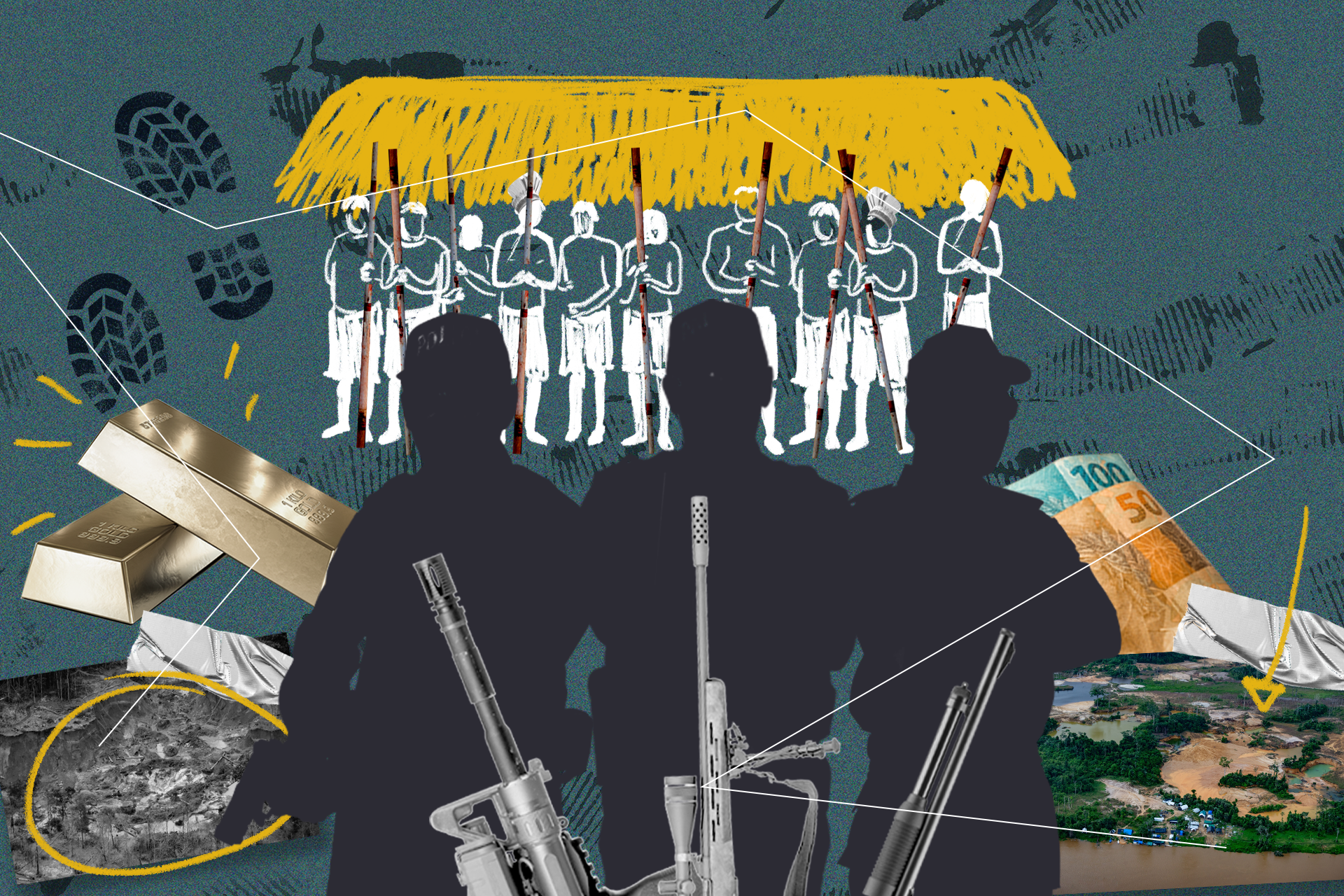
The investigation has also shown the group’s close ties to illegal mining in the Amazon.
According to the task force, a man who worked as a private guard in an illegal mine in Yanomami Indigenous Land, identified as Jaime Miguel de Moraes, was the person responsible for recruiting armed security and organizing the transport of gold and precious stones from illegal mining operations on indigenous lands.
The information is in sealed depositions and suggests that military police officers from the Legislative Assembly Intelligence Service may be involved in the shipment of weapons to mining sites on the Uraricoera River. There’s a de facto war over Yanomami Indigenous Land in the region, brought about by invaders trying to exploit the territory.
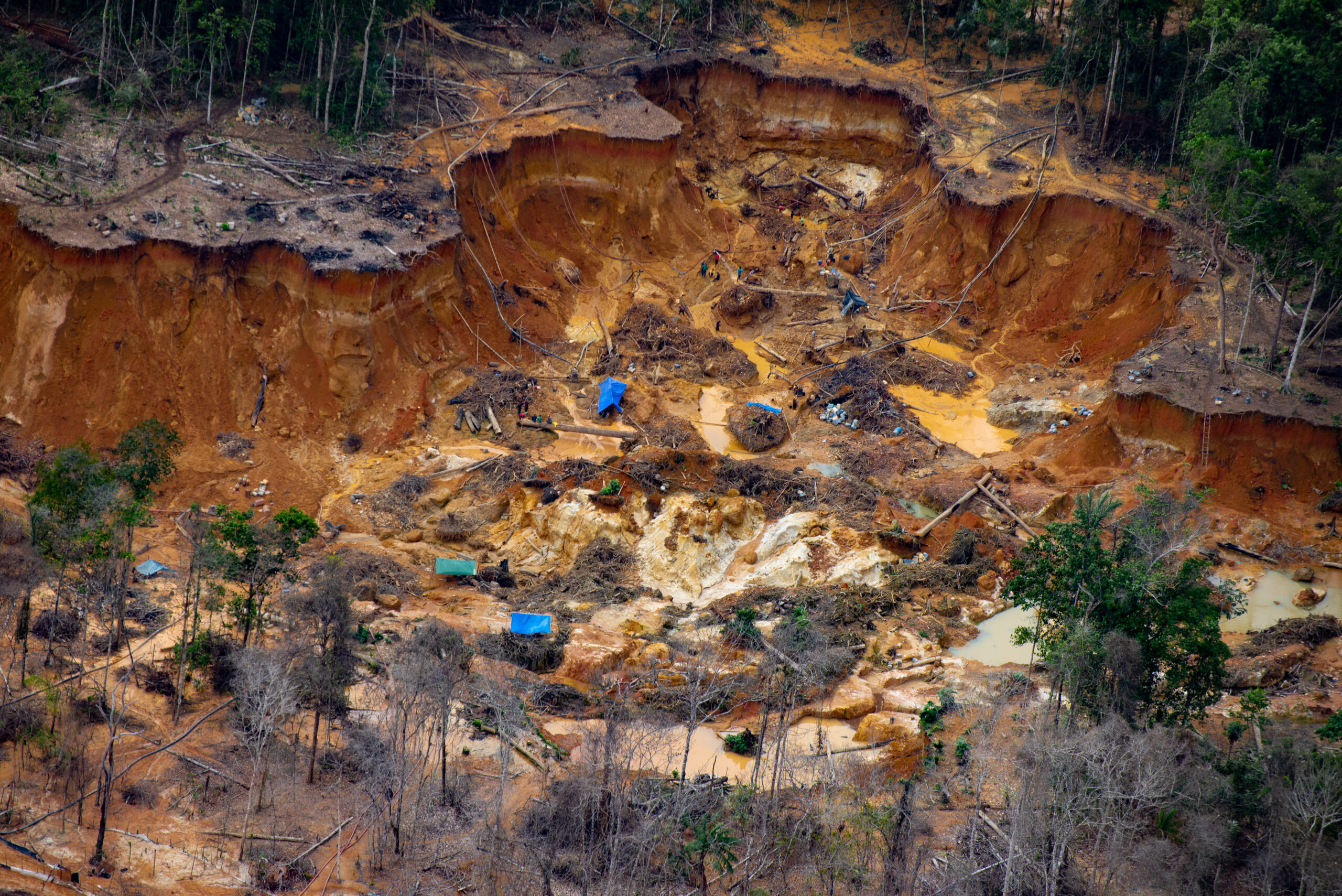
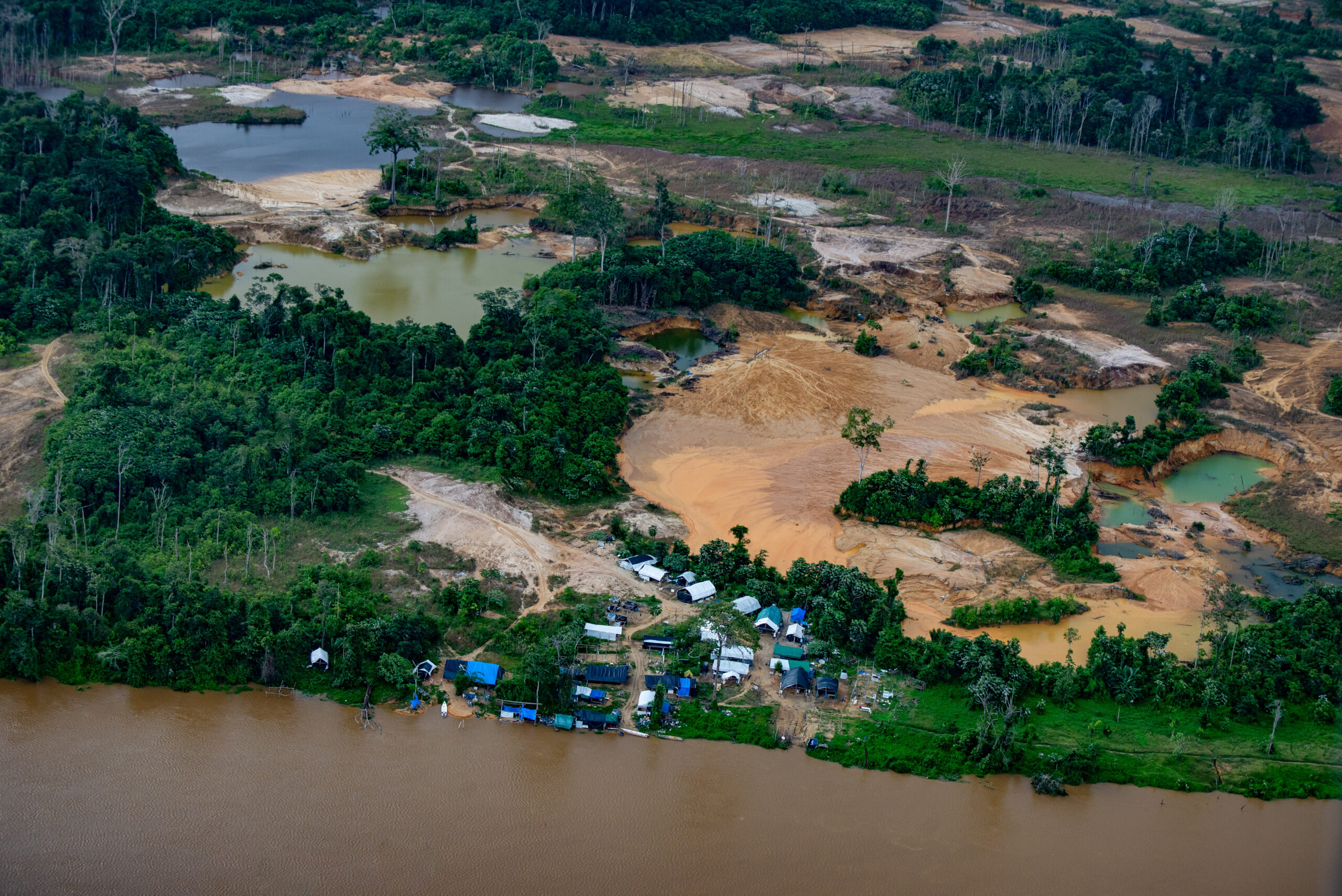
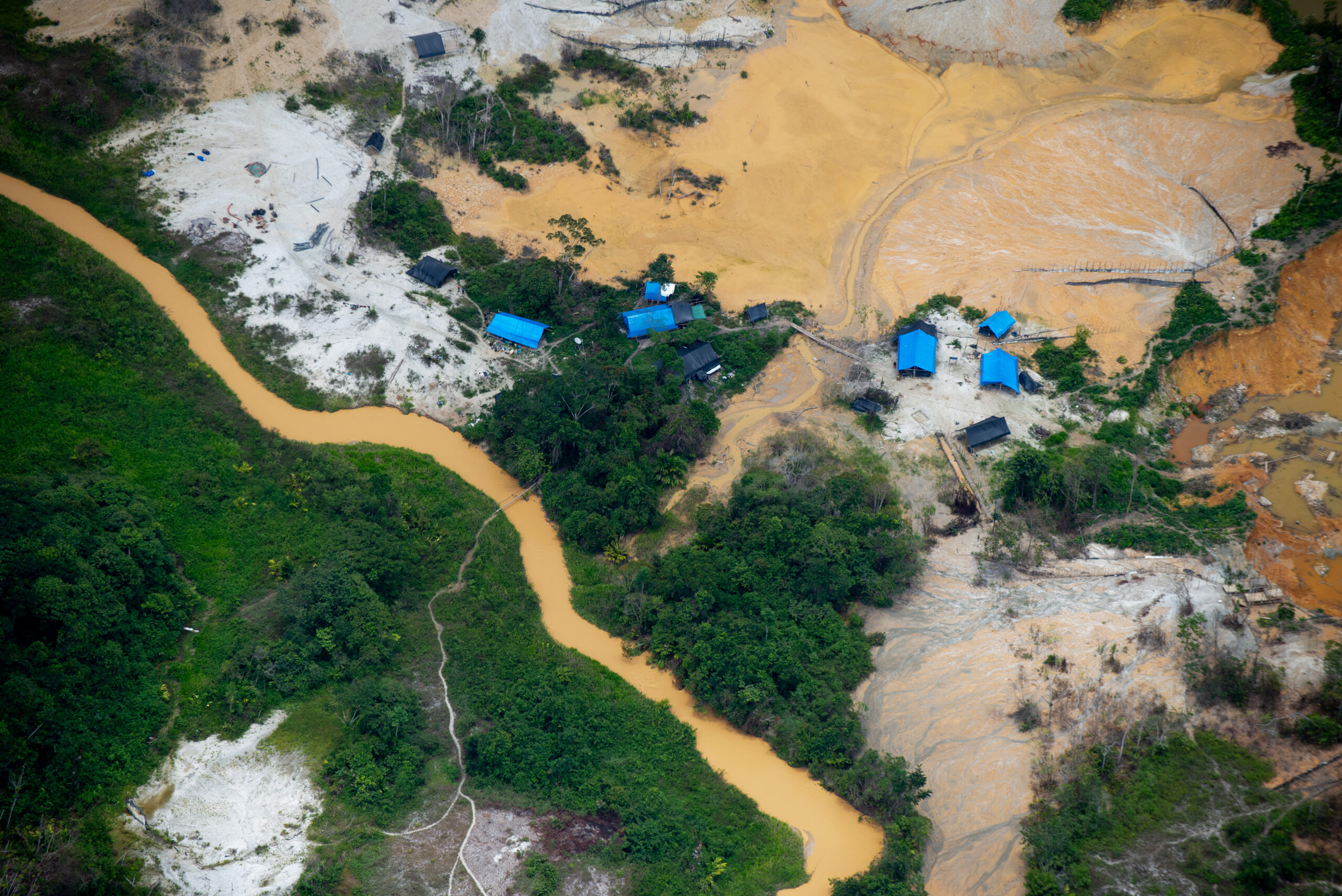
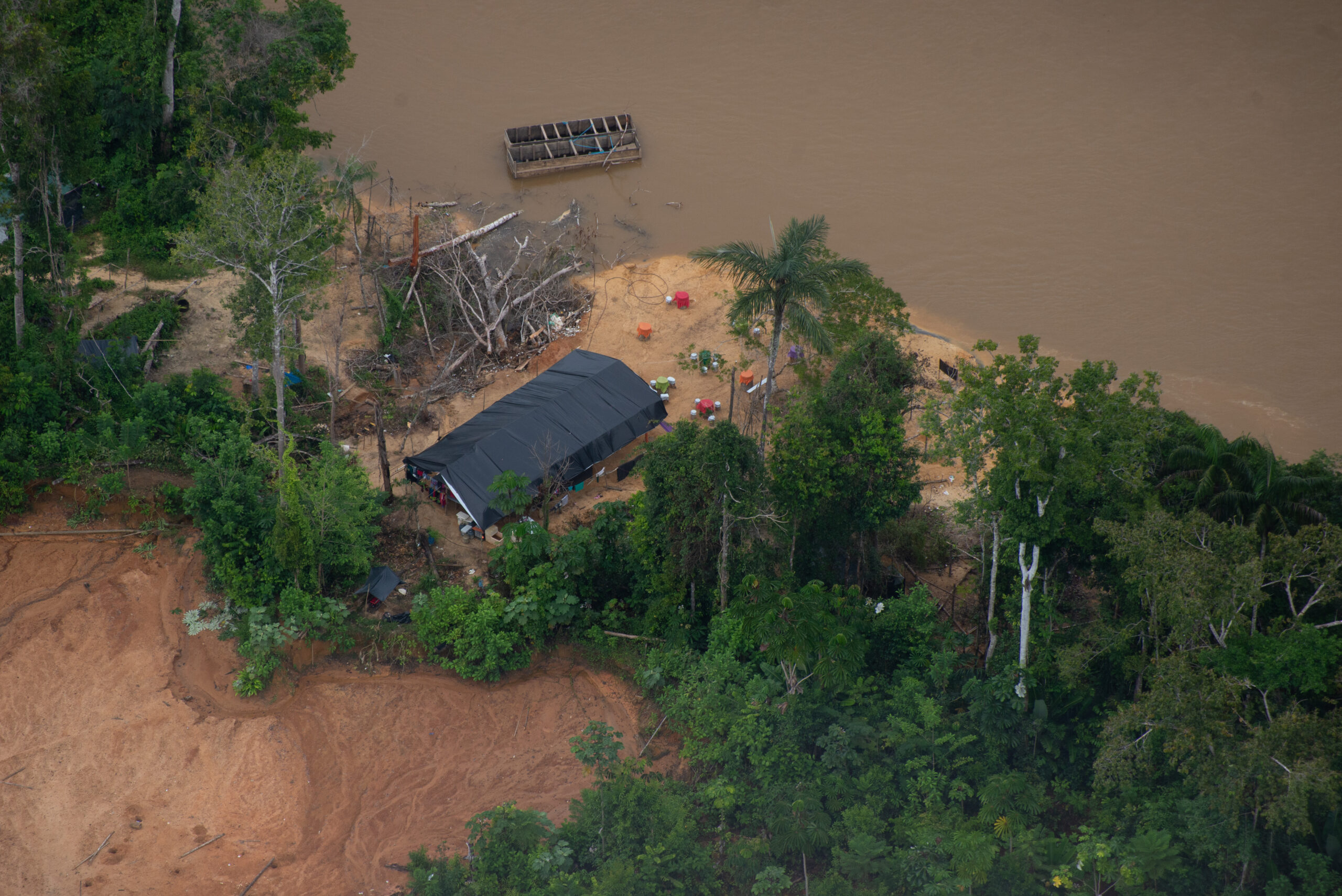
Heavily armed, the illegal miners resist even government patrols. Federal Police and Brazilian Institute of Environment and Renewable Natural Resources (Ibama) patrol agents were shot at during an operation carried out in the village of Palimiu in 2021. It was in this region last September that Ibama seized 11 aircraft, all linked to the illegal mining on the Uraricoera River, within the Yanomami Indigenous Land.
“In fact, we found that people linked to the organization supplied weapons to mines and also transported valuables from these locations,” said police chief João Evangelista dos Santos.
We found that people linked to the organization supplied weapons to mines and also transported valuables from these locations.
Police chief João Evangelista dos Santos
In 2019, congressman Jalser promised that he would seek a solution to the illegal mining issue in Roraima, after another confrontation and more arrests of illegal miners by the Army in the state. At the time, Jalser asked the Assembly’s Human Rights Commission to take action to release the miners that had been arrested for the illegal operations. In January 2021, still under Jalser’s command, the Legislative Assembly approved a bill that allowed mining in Roraima, including the use of mercury, which is banned in the country for being a toxic substance that contaminates the rivers. The law was later annulled by a unanimous Supreme Court decision.
Dirty money
The evidence the police gathered while investigating the kidnapping of Romano dos Anjos allowed the authorities to lift the telephone and bank secrecy of several of the suspects. This information led to the disclosure of other activities of the militia.
The police found evidence that the group had suspicious dealings with By Money, a financial institution that operated without authorization from the Central Bank and promised returns on capital well above those offered on the market. The investigation revealed that some of By Money’s main investors had ties to the militia.
The police found four contracts of commissions in international financial operations related to By Money. The contracts were with sub-lieutenant Clóvis Romero, a SISO worker who at the time was working as congressman Jalser’s personal guard.
Like the militias that operate in Rio de Janeiro state, the criminal organization we investigate has also been dedicated to the illegal provision of armed security services for private companies.
Excerpt from the Task Force investigation report
In April of last year, By Money had been the target of Operation Loki, under the accusation of practicing a financial pyramid – an unsustainable investment model. The investigation by the Federal Police pointed out that, in less than a year, the company had a turnover of BRL 90 million (US$17.5 million). “Like the militias that operate in Rio de Janeiro state, the criminal organization we investigate has also been dedicated to the illegal provision of armed security services for private companies,” says an excerpt from the investigation.
The golden boy
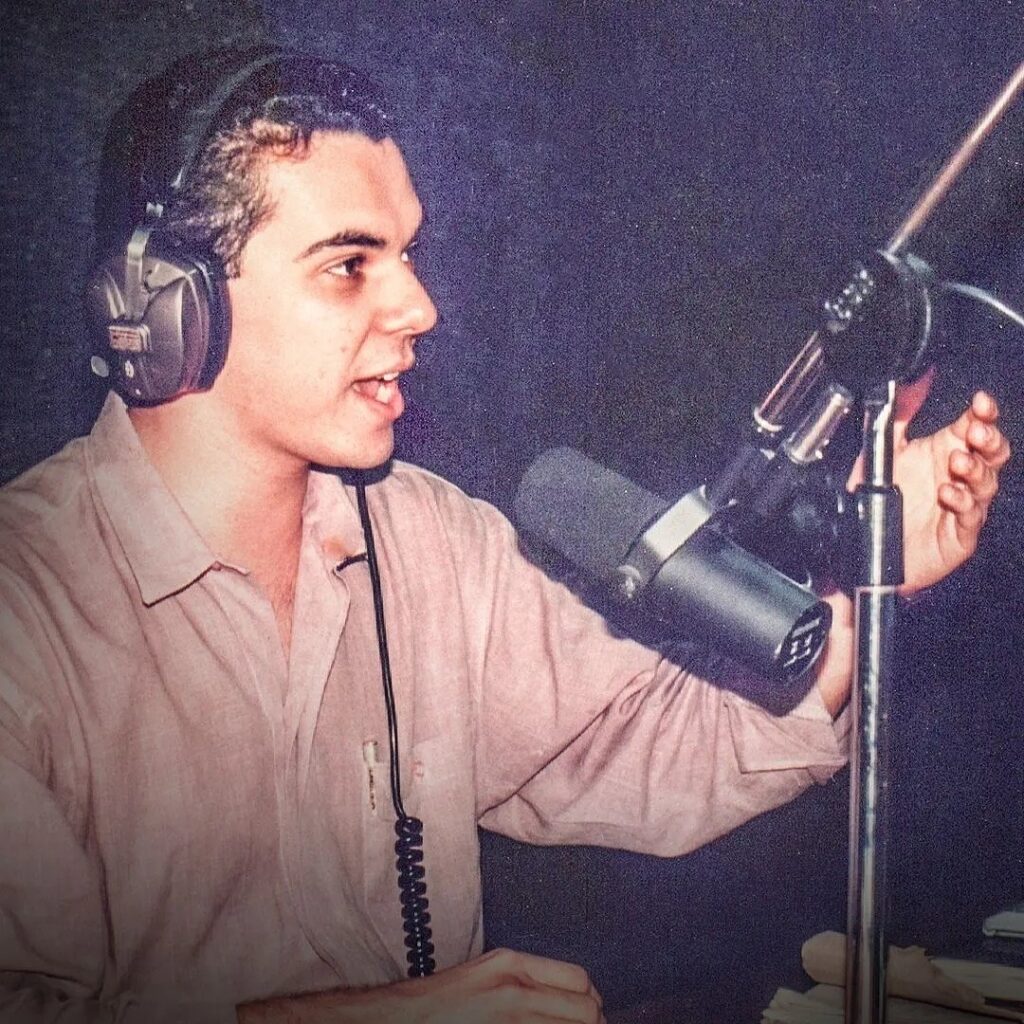
Jalser is one of the most powerful politicians in Roraima. Before being known as the “Golden Boy” of politics, Jalser made a name for himself as a radio host. He has been a member of parliament for 28 years and was in his seventh term. He has already been investigated in other corruption cases, and in one of them he had been arrested, but managed to drop the charges.
On his social media, he often appears smiling around children. The public image contrasts with his criminal records. In 2018, for example, he broke into a radio station and attacked the mayor of Boa Vista, Teresa Surita (MDB). Images show that Jalser chased the woman to her car and punched her.
Jalser and his wife, Cinthya Gadelha, also like to display their wealth. In 2019, a police operation seized 22 designer bags valued at more than BRL 180,000 (about US$36,000) and a collection of jewels and vehicles at his house. According to the police, the products had been bought with public money from the Legislative Assembly.
The other side
InfoAmazonia contacted the Military Police command to ask about the arrested soldiers’ case, but they didn’t respond. We were unable to contact the financial By Money. Congressman Jalser Renier was contacted through his Press office, but he did not respond until the publication of this report.
This story was produced with support from Report for the World, a The GroundTruth Project initiative.


